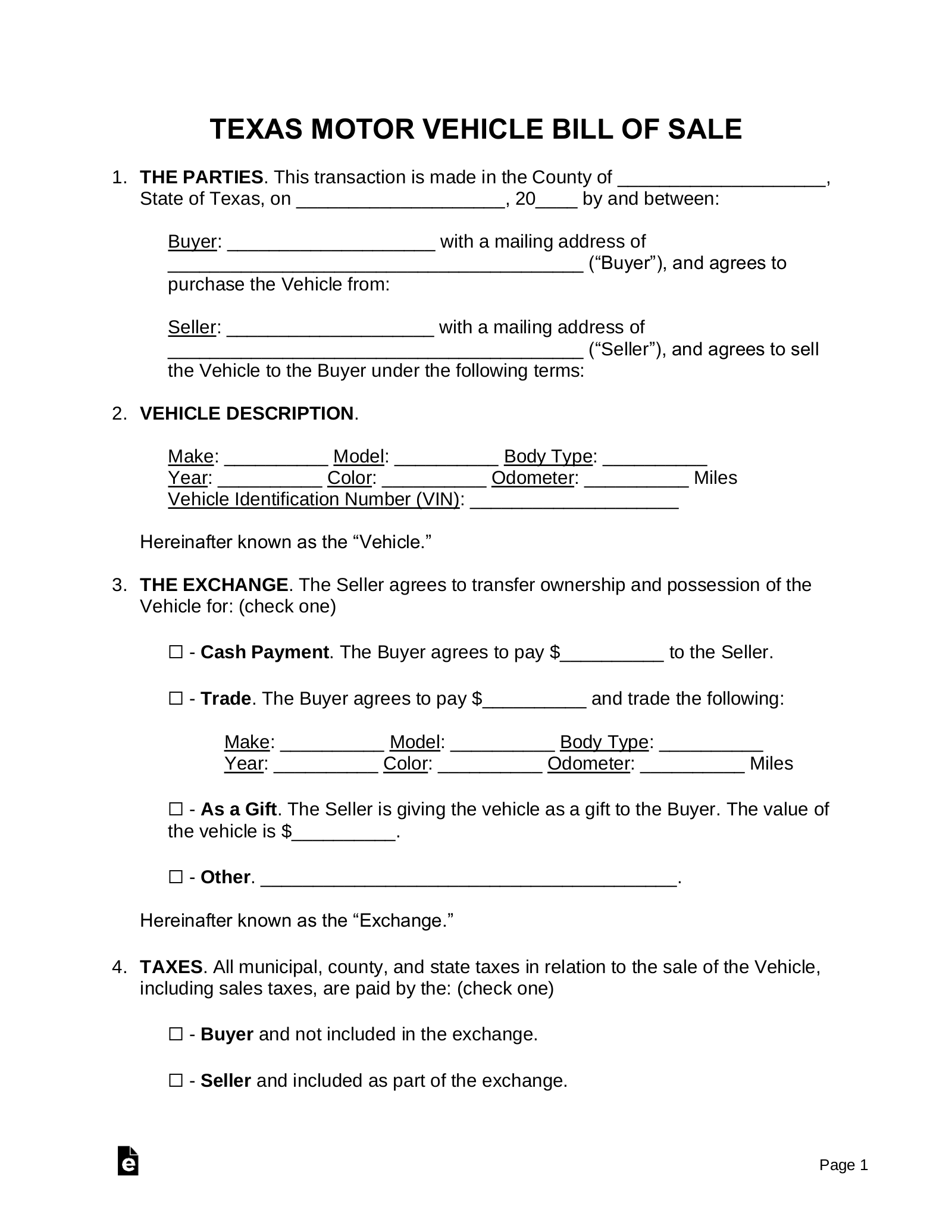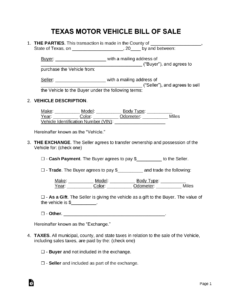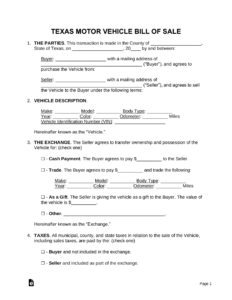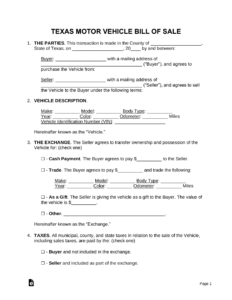Buying or selling a vehicle in Texas is an exciting milestone, whether you are upgrading your ride or passing on a trusty set of wheels. While it might seem straightforward, there are a few important steps to ensure the transaction goes smoothly and legally for both parties involved. One of the most crucial documents you will encounter, and perhaps the one that offers the most peace of mind, is the vehicle bill of sale.
This simple yet powerful document acts as a legal receipt for the transaction, proving that the ownership of the vehicle has officially changed hands. It’s more than just a piece of paper; it is a vital record that can protect both the buyer and the seller from future disputes or misunderstandings. Understanding its purpose and knowing how to use it correctly is key to a hassle-free experience in the Lone Star State.
What is a Texas Vehicle Bill of Sale and Why Do You Need One?
A Texas vehicle bill of sale is essentially a legal document that records the transfer of ownership of a motor vehicle from one party to another. Think of it as a detailed receipt for your car, truck, motorcycle, or other vehicle. It provides concrete proof of the transaction, detailing who sold what to whom, for how much, and when. While not always a mandatory document for titling and registration in Texas compared to some other states, it is highly recommended and serves as invaluable evidence for both the seller and the buyer.

For the seller, a properly completed bill of sale is your official record that you no longer own the vehicle. This is incredibly important for liability reasons. Once you sell a vehicle, you want to ensure that you are not held responsible for any accidents, parking tickets, or other incidents that occur after the sale date. The bill of sale clearly marks the precise moment your ownership ended, helping you avoid potential legal headaches down the road. It also serves as proof for tax purposes and when removing the vehicle from your insurance policy.
On the flip side, for the buyer, the bill of sale acts as undeniable proof that you legitimately purchased the vehicle. This document will be essential when you go to register the vehicle with the Texas Department of Motor Vehicles (TxDMV) or your local county tax assessor-collector’s office, especially if there are any discrepancies or questions about the sale. It helps to prevent any claims of theft or ownership disputes from a previous owner, giving you peace of mind that your new purchase is truly yours. It is also your record of the purchase price, which can be useful for budgeting or future sale.
Having a clear and complete texas vehicle bill of sale template filled out properly helps both parties avoid any confusion about the terms of the sale, the condition of the vehicle at the time of transfer, and the agreed-upon price. It formalizes the exchange in a way that verbal agreements simply cannot, protecting everyone involved.
Key Information to Include in Your Texas Vehicle Bill of Sale Template
- Full names and addresses of both the buyer and the seller.
- Date of the sale.
- Detailed description of the vehicle, including make, model, year, color, and Vehicle Identification Number (VIN).
- Odometer reading at the time of sale.
- Agreed-upon purchase price.
- Any specific terms of sale (e.g., “as-is” condition).
- Signatures of both the buyer and the seller.
Finding and Using Your Texas Vehicle Bill of Sale Template
When you are ready to complete your vehicle transaction, finding a reliable texas vehicle bill of sale template is your next step. Fortunately, there are many reputable sources where you can obtain a suitable template. The Texas Department of Motor Vehicles (TxDMV) website is a great place to start, as they often provide official forms or links to acceptable templates that meet the state’s requirements. Many legal document websites and online automotive resources also offer free downloadable versions that are designed specifically for Texas vehicle sales, ensuring all the necessary fields are present.
Once you have your template, the most important part is filling it out accurately and completely. Take your time to double-check all the information you are entering. Errors in names, addresses, VINs, or sale prices can cause delays or issues down the line when trying to register the vehicle or resolve a dispute. It is always a good idea to have both the buyer and seller present when filling out the form to ensure agreement on all details and to prevent any misunderstandings. Make sure the odometer reading is precise at the exact moment of sale, as this is a crucial piece of information for registration and future sales.
Signatures are what make the bill of sale a legally binding document. Ensure that both the buyer and the seller sign the document, and it is a good practice for each party to initial every page if the document is longer than one page. While notarization is not always required for a bill of sale in Texas, having it notarized can add an extra layer of legal validity and peace of mind, especially for higher-value transactions or if there is any concern about future disputes. A notary public simply verifies the identities of the signers, confirming that they are who they claim to be.
After the texas vehicle bill of sale template is fully completed and signed by both parties, it is crucial that each person receives a copy. The seller should keep a copy for their records, along with removing their license plates and informing their insurance company. The buyer will need their copy, along with the vehicle’s title, to register the vehicle in their name at the local county tax assessor-collector’s office. This ensures that the transfer of ownership is legally recognized and that both parties have the documentation they need for their respective post-sale responsibilities.
Navigating the process of buying or selling a vehicle in Texas doesn’t have to be complicated. By understanding the importance of the vehicle bill of sale and knowing how to properly utilize a suitable template, you can ensure a smooth, legal, and stress-free transaction for everyone involved. This document serves as a protective shield, offering clarity and legal standing whether you are the one selling your beloved car or purchasing a new set of wheels. Keep good records, follow these guidelines, and you will find that your vehicle transaction in the Lone Star State is as clear as a sunny Texas day.



